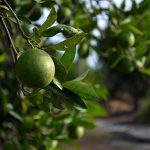
According to Florida Citrus Mutual, the total impact of citrus in Florida is approximately $9 billion a year and represented about 63 percent of total U.S. production for the 2010-2011 season. This could explain why the U.S. Department of Agriculture awarded UCF a $1.21 million grant to study citrus diseases, such as canker and greening, that have emerged in recent years.
“Our group has been developing a formula to prevent citrus canker disease,” said Swadeshmukul Santra, an associate professor for the NanoScience Technology Center, Department of Chemistry and Biomolecular Science Center.
Citrus canker disease is caused by bacteria spread by rainy weather, which creates lesions on the leaves, stems and fruit of citrus trees. It causes the leaves to fall early and the fruit to taste bitter. Greening is a more severe version of the canker disease that directly affects the tree and kills it.
There are several pesticides and biocides available in the market that growers use eight to 10 times in a season that, from April to November, yield a good crop. The biocide prevents the diseases, which are spread by the Asian citrus psyllid bug and bacteria, from attacking the tree and causing early fruit drop, black spotting and gradual deaths of the trees.
“Our research is particularly focused on copper,” Santra said.
Copper-based pesticides have been used since the 1960s because it is a good antimicrobial and antifungal agent; however, no substantial advances have been made to advance the technology. The most current one, which, Santra said, is known as the gold standard, Kocide 3000, still contains a small amount of copper. The goal is to continue to minimize the amount of copper per application using nanotechnology.
“In nanotechnology, a small amount is more power,” Santra said. “So we’d like to minimize the dumping of copper in agricultural soil.”
The eight to 10 applications per year, for several years, on groves cause the copper to build up in the soil once it is rinsed or washed off with the rain. Minimizing copper in the soil would promote citrus root health and would prevent copper from contaminating other ecosystems. Copper is not good for soil in terms of toxicity. It’s a micronutrient present in soil, animals and humans. In excess amounts, though, copper can be harmful.
“Copper-based pesticides can have non-target effects in both terrestrial and aquatic environments, especially when applied at high concentrations or with high frequency,” said Patrick Bohlen, of the UCF Department of Biology.
The effects on the ecosystems include changing the growth, survival and reproduction of the local life. This is concerning for the U.S. Environmental Protection Agency, which has put new regulations on the amount of copper that can be dumped in groves.
“Some groves are close to reaching their limits,” Santra said. “They are actively looking for new technology, new material, that way they can still apply pesticides. So there’s a strong demand for a new formula that uses less amount of copper or no copper.”
The solution Santra developed is to use sand-based silica as a delivery system for the pesticide.
“This spray forms a very thin film on the surface of the plant, on the leaves surface, on the stem surface and fruit,” Santra said. “But all you have in that film is sand and copper.”
When copper is added to the nanoparticle gel, it changes its properties, so it becomes more potent and effective. It would also improve how strongly the formula adheres to the plant and fruit. It ultimately means less copper is needed but the effects are not compromised, Santra said. With the new funding received, Santra will begin working on a formula that contains no copper and can be applied to any fruit, not just citrus.
Harold Browning, director of the University of Florida’s Citrus Research and Education Center in Lake Alfred, said these diseases have not been successfully eradicated in other countries, and they top the list of worries for the Florida citrus industry. Putting these formulas into the market would be beneficial to Florida’s growing citrus industry. On May 7, the Coca-Cola Co. committed $2 billion to support the planting of 25,000 acres — the largest planting in 25 years — of new orange groves in Florida for their Minute Maid and Simply Brands beverages.
With the new funds, Santra hopes to have the product on the market soon to protect and manage Florida’s signature crop.
Originally posted by the Central Florida Future.